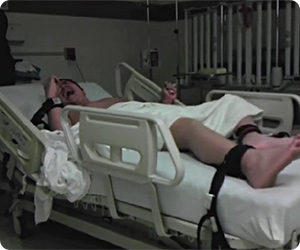 The rates of chronic disabilities and illness are skyrocketing with each passing day: asthma, nutritional deficiencies, immune system dysfunction, ADHD, autism, speech and language delays, anaphylactic allergies. Media would have you believe that these are simply the new normal and therefore not alarming. There is even a faction of deniers who chalk these diagnoses up to parental Munchausen by Proxy.
The rates of chronic disabilities and illness are skyrocketing with each passing day: asthma, nutritional deficiencies, immune system dysfunction, ADHD, autism, speech and language delays, anaphylactic allergies. Media would have you believe that these are simply the new normal and therefore not alarming. There is even a faction of deniers who chalk these diagnoses up to parental Munchausen by Proxy.
Amongst my like-minded friends and family, though, a sentiment is often shared: “What are we doing to our children?” A new documentary from Autism Media Channel demonstrates just what is being done to younger and future generations, and the catastrophic consequences of treating these conditions as either psychosomatic or figments of our imagination.
Who Killed Alex Spourdalakis, directed by Dr. Andrew Wakefield, takes us through the medical history and final months of a severely autistic teenage boy from Chicago. Alex’s early childhood development and the onset of autism mirrors what is experienced by scores of previously healthy toddlers who regress after a series of vaccines. The retelling of his descent into a world of self-injury, repeated illnesses, and bowel disturbances will be all too familiar, and painfully so, for many families. On a self-guided quest to help him recover, Alex’s mother and godmother discovered underlying medical issues, such as food allergies, that they were able to alleviate with interventions.
 But, as he grew older, he experienced a return to severe behaviors which repeatedly landed him in hospitals. What unfolded at age 13 serves to reveal the ignorance and negligence of which the medical community is capable, and to what lengths they will go to avoid acknowledging the medical nature of autism. Rather than listening to his loved ones, doctors tie Alex to his hospital bed and begin to administer a revolving door of medications with dangerous side effects. He is subjected to a wide variety of pharmaceuticals, none of which are intended for his conditions.
But, as he grew older, he experienced a return to severe behaviors which repeatedly landed him in hospitals. What unfolded at age 13 serves to reveal the ignorance and negligence of which the medical community is capable, and to what lengths they will go to avoid acknowledging the medical nature of autism. Rather than listening to his loved ones, doctors tie Alex to his hospital bed and begin to administer a revolving door of medications with dangerous side effects. He is subjected to a wide variety of pharmaceuticals, none of which are intended for his conditions.
Alex’s inflammatory bowel disease – the source of his physical pain which manifested itself as violent outbursts and self-injury – is left ignored and untreated. He is shuttled from hospital to hospital, practitioner to practitioner, and ultimately discharged without a treatment plan and in the absence of supports for his family members, who carried the enormous weight of his care. Days later, Alex is found dead from a knife wound to the chest. His two caregivers, always by his side, are discovered alongside Alex’s lifeless body.
The details of Alex’s final months of life are indeed tragic, but unfortunately not unique. Parents of children with severe autism and related disorders often experience desperation, isolation, mental fatigue, and depression so agonizing that they are unable to see their way out. Although this story happens amidst the backdrop of autism, you could potentially insert one of dozens of childhood disorders in its place. Autism is merely a microcosm of this country’s childhood epidemics.
 Thanks to the very foundation upon which modern pediatric care was built – universal vaccination – we are experiencing widespread increases in once-rare neurological diseases and impairments. And although these conditions are now considered common, they are often still treated under an antiquated model of care which dictates that they are merely psychological or psychiatric in nature. The effects of this approach are often disastrous. From boys on Risperdal growing breasts and toddlers with bowel disease that, left untreated, causes failure to thrive to elementary school girls with a history of antidepressant use attempting suicide, the mainstream medical complex is effectively destroying the lives it claims to protect.
Thanks to the very foundation upon which modern pediatric care was built – universal vaccination – we are experiencing widespread increases in once-rare neurological diseases and impairments. And although these conditions are now considered common, they are often still treated under an antiquated model of care which dictates that they are merely psychological or psychiatric in nature. The effects of this approach are often disastrous. From boys on Risperdal growing breasts and toddlers with bowel disease that, left untreated, causes failure to thrive to elementary school girls with a history of antidepressant use attempting suicide, the mainstream medical complex is effectively destroying the lives it claims to protect.
Though viewers will walk away understandably saddened and angry, it is well worth the tears and clenched fists. Alex’s life and untimely death are a wake-up call to parents and healthcare professionals everywhere. If you’re wondering what we are doing to our children, it is now very clear. We are harming them, and we are killing some. Unless we learn from these mistakes, we are destined to repeat them over and over in future generations, except the impact will be more pervasive and damaging. We hold in our hands the opportunity to honor Alex and not allow his death to be in vain, simply by deciding that this cycle must end NOW.
Autism Media Channel’s world premiere of Who Killed Alex Spourdalakis will take place on Thursday, October 16 at 7:30 p.m. at the Northpark AMC in Dallas, TX. Reserve your tickets now as seating is limited, and tickets will not be available on the day of the event. If you are interested in attending or hosting a screening of Who Killed Alex Spourdalakis, please visit www.tugg.com for dates and details on how to become a promoter.
~ Lone Star

















Just the trailer for this movie has me crying uncontrollably. As a parent of an older, violent, child with severe colitis, who is now 19, I understand the horror that this family has gone through to some degree. All our children are getting older, we are becoming more and more exhausted, and the medical community is still completely clueless, and at worst treats our children worse than you would treat a sick animal. I hope and I pray that this film will win critical acclaim, and put the spotlight on how sick these children actually are. I do not understand what it is going to take for the medical community to wake up and realize the crisis that is in our midst. My child is now 19, and has been a patient of Dr. Krigsman since he was five years old. I thought that by now, it would be common knowledge at least that these children have gastrointestinal disease. It absolutely makes me sick to my stomach, that medicine has not recognized these children.
Amen Val. Someone needs to tap into the knowledge and insight parents have gained into this population and make some serious changes for GOOD.
I came to this site to see if there is a discussion on the rash of moms attempting to kill themselves and their ASD children. My heart is heavier with each news story, and they seem to be appearing more and more frequently. Comments online and reporters’ leaning all blame the mother, of course. Until you have lived with a severely ill older child, who beats you as you try to care for him, you cannot know the hell. We have basically not budged from the “refrigerator mother” theory. It is still all the mom’s fault. Is anyone tracking these statistics? Making our children so ill, destroying so many lives is just a crime against humanity.
The film makes it very clear what a tremendous burden Dorothy bore in trying to get help for her big, strong, very violent and very sick child. The film details the horrendous journey they had through the medical world, and the many, many times the family was completely let down. What is happening to the health of children in this country is a crime, and it’s crucial that get more mainstream awareness of these issues.
There is never an excuse to kill or abuse an autistic child. Be very careful, because if you support this you OPEN THE DOOR for every sick twisted freak caregiver abuser who will use this as a defense. The fact is in the parent’s or family close situation the situation is different. This is the family unit that has been shattered. IT’s been traumatic. IT’s been hard. It’s been years of poorly given services by our government entities. This has gone on for years and autism speaks isn’t speaking about it. It’s gone on and autism experts know nothing about it. It’s gone on for years and our politicians do nothing about it. The solution is more funding to help families who are in crisis trying to deal with severely autistic children, teens and adults. Severe autism is unlike any other disability. These are incredibly bright, individuals with a potential to be SO MUCH more, but by NO FAULT Of their own, are struggling with severe autism. It’s up to every ASPIE and HF autistic to speak up for the severely autistic population and make sure they are getting the services they need!
A lot more than “services” is required, Ian. Alex Spourdalakis was a very sick boy, as are many children with severe autism. Frequently, their illnesses are ignored by the medical establishment with a shrug and a “that’s just autism.” Alex was treated by people at the hospital with powerful psychoactive drugs for illnesses he didn’t have, all because the hospital staff refused to listen to those who knew there was something physically wrong with Alex at the root of his “aggressive behavior.” In addition, probably inappropriate psych meds were prescribed for his mother. None of those medications come without side effects, some of them very dangerous. No one is saying that there is an “excuse” to kill or abuse an autistic child. However, there are tragic circumstances that can be avoided if people are treated properly, including services that support family units that are dealing with the extremely difficult challenges that can be presented by severe autism. Everyone has a breaking point, where they can no longer function rationally or effectively. It would be wise if we, as a nation, could be pro-active enough to seek out those people who are likely to hit that breaking point and offer the help that is required to get past it.
I would agree that people with severe autism are struggling through no fault of their own; however, that doesn’t mean that they are all “incredibly bright.” Certainly some are, but to assume they all are would be just as inaccurate as assuming that because some are “criminally aggressive” that all are. Autism can happen to children of any basic intellectual capacity.